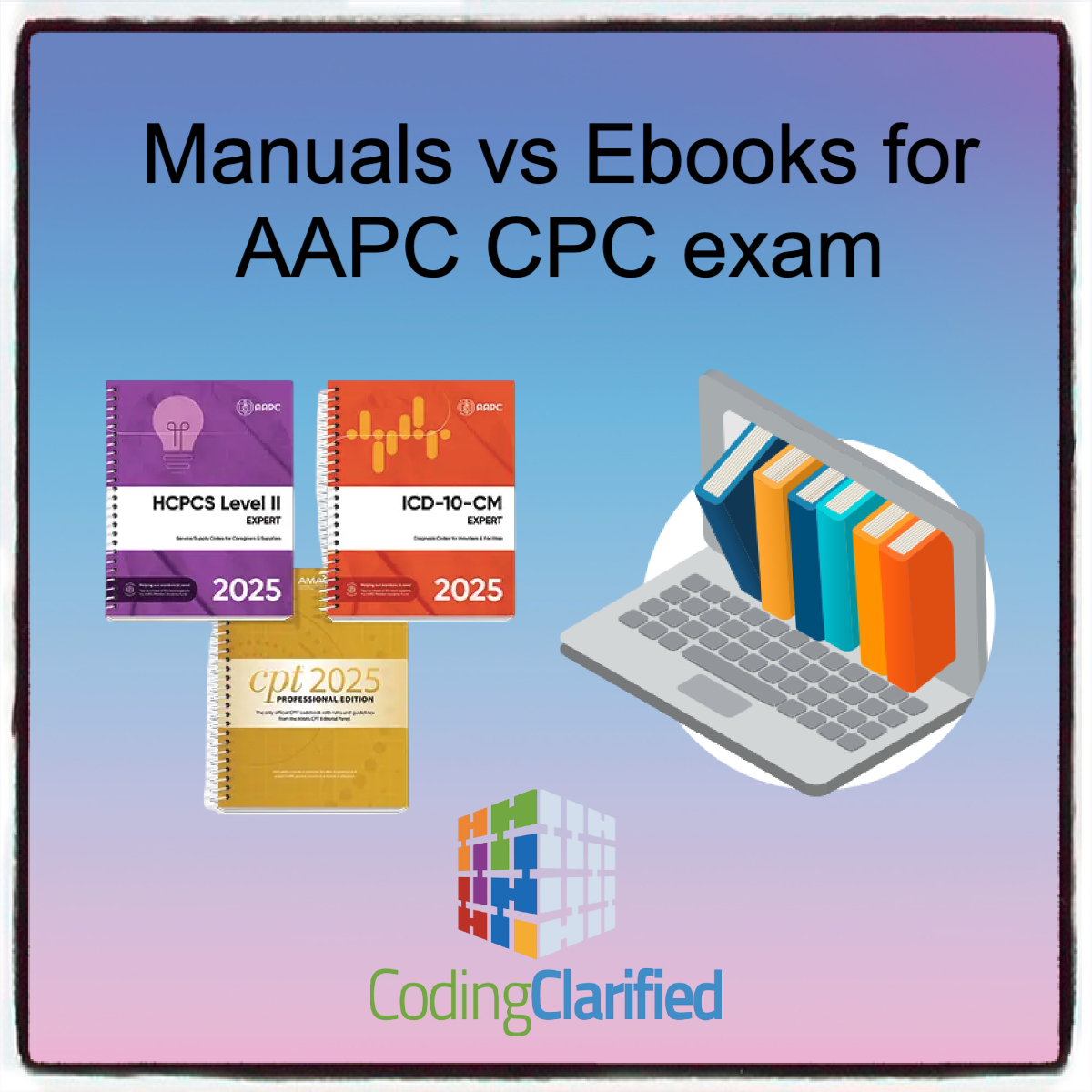Using Physical Manuals vs. eBooks for the AAPC CPC Exam: Pros and Cons
The AAPC Certified Professional Coder (CPC) exam is a rigorous test designed to assess a candidate’s ability to accurately code medical procedures, diagnoses, and services. Preparation is key to success, and many candidates wonder whether using physical manuals or eBooks will be the most effective way to study. Here, we will explore the pros and cons of both approaches.
1. Using Physical Manuals for the AAPC CPC Exam
Pros:
- Ease of Navigation: Many coders find it easier to quickly flip through a physical manual when looking for a specific code. You can bookmark key pages and use sticky notes to help organize important sections for easy access during the exam.
- Hands-on Learning: For some individuals, handling a physical book can enhance memory retention and the learning experience. Writing notes in margins or highlighting key concepts can improve comprehension.
- No Technical Distractions: Physical manuals don’t have the potential for digital distractions. There are no notifications, pop-ups, or battery issues to worry about during exam preparation.
- Familiarity: If you’ve used physical manuals in the past, you may feel more comfortable with them. For example, many coders rely on the ICD-10-CM, CPT, and HCPCS Level II manuals and are used to searching through these books quickly.
Cons:
- Heavy and Bulky: Physical manuals are often large and heavy, making them difficult to transport. This can be a disadvantage for those who prefer to study on the go or in different environments.
- Limited Search Capabilities: Searching for specific codes can take time with a physical manual. There is no instant search function to jump to the exact page you need.
- Updating Issues: Medical coding books often get updated yearly. This means that if you rely on physical copies, you must be mindful of the updates and may need to purchase new editions frequently to stay current.
- Limited Interactive Features: Physical books can lack interactive features, such as hyperlinks, clickable indexes, and video tutorials, which are available in digital formats.
2. Using eBooks for the AAPC CPC Exam
Pros:
- Portability and Convenience: eBooks are lightweight and can be accessed on various devices, such as tablets, laptops, and phones. This makes it easy to study on the go and carry all necessary resources without the bulk of physical manuals.
- Search Functionality: eBooks typically have a built-in search function, allowing you to quickly locate codes, terms, and sections. This can save time and reduce stress during exam preparation.
- Instant Updates: eBooks can be easily updated to reflect the most current editions of coding manuals, ensuring you have the most accurate information. This eliminates the need to purchase new physical copies every year.
- Multimedia Integration: Some eBooks offer multimedia tools, such as videos, tutorials, and quizzes, which can help reinforce learning. Interactive features like clickable links to external resources can also provide additional support.
- Customization and Annotation: Many eBook platforms allow you to highlight text, add notes, and bookmark pages, just like physical books, but with the added benefit of being able to organize your study materials in a more dynamic way.
Cons:
- Device Dependency: eBooks rely on electronic devices and a stable internet connection, which could be problematic if you experience technical issues or run out of battery during study sessions.
- Distractions: Studying with an eBook on a device can present distractions, such as notifications from other apps or the temptation to check social media.
- Learning Curve: Some individuals may find it more challenging to navigate eBooks, especially if they are used to physical manuals. The interface may take time to get used to, and some users may struggle to adapt to the digital format.
- Eye Strain: Prolonged screen time can lead to eye strain, headaches, or fatigue, which might hinder your ability to focus during study sessions.
Which Option is Best for You?
Ultimately, the decision between using physical manuals and eBooks for the AAPC CPC exam depends on personal preferences and study habits. Here are some factors to consider:
- Learning Style: If you’re a tactile learner who benefits from physically flipping through pages, a physical manual may work better for you. However, if you prefer technology and the convenience of searching, an eBook may be a better fit.
- Study Environment: Consider your study habits and where you typically study. If you study in different locations, the portability of an eBook could be advantageous. However, if you have a designated study area, the weight of a physical manual may not be an issue.
- Budget: Physical manuals can be expensive, and purchasing new editions each year can add up. On the other hand, eBooks can offer more affordable options and free updates, although you may need to purchase a new device if you don’t already own one.
- Exam-Day Considerations: While eBooks can be helpful during exam preparation, remember that the actual CPC exam is a paper-based exam where you will need to rely on physical manuals. Therefore, practicing with physical copies may help build familiarity with how you will use them during the test.
Both physical manuals and eBooks have their benefits and drawbacks when it comes to preparing for the AAPC CPC exam. Physical manuals are great for those who prefer a more traditional study approach, while eBooks offer portability, quick searching, and interactive features. Ultimately, the best option will depend on your individual study preferences and needs. Many candidates choose to use both, combining the tactile benefits of physical books with the convenience and speed of eBooks to create a balanced study experience.

